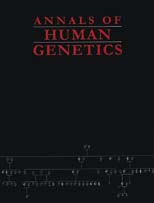Crossref Citations
This article has been cited by the following publications. This list is generated based on data provided by
Crossref.
Huisman, J.
and
Slijper, F. M. E.
2002.
Psychologische kenmerken van meisjes met het syndroom van Turner.
Tijdschrift voor kindergeneeskunde,
Vol. 70,
Issue. 3,
p.
173.
Nijhuis-van der Sanden, Maria W.G
Eling, Paul A.T.M
and
Otten, Barto J
2003.
A review of neuropsychological and motor studies in Turner Syndrome.
Neuroscience & Biobehavioral Reviews,
Vol. 27,
Issue. 4,
p.
329.
Gault, EJ
Paterson, WF
Young, D
and
Donaldson, MDC
2003.
Improved final height in Turner's syndrome following growth‐promoting treatment at a single centre.
Acta Paediatrica,
Vol. 92,
Issue. 9,
p.
1033.
Martins, Rosa R.S.
Ramos, Hilda I.B.
Llerena Jr., Juan C.
and
Almeida, José C.C.
2003.
Investigação clínica e genética em meninas com baixa estatura idiopática.
Arquivos Brasileiros de Endocrinologia & Metabologia,
Vol. 47,
Issue. 6,
p.
684.
Rovet, Joanne
2004.
Turner Syndrome: Genetic and Hormonal Factors Contributing to a Specific Learning Disability Profile.
Learning Disabilities Research & Practice,
Vol. 19,
Issue. 3,
p.
133.
Leppig, Kathleen A.
Sybert, Virginia P.
Ross, Judith L.
Cunniff, Christopher
Trejo, Tina
Raskind, Wendy H.
and
Disteche, Christine M.
2004.
Phenotype and X inactivation in 45,X/46,X,r(X) cases.
American Journal of Medical Genetics Part A,
Vol. 128A,
Issue. 3,
p.
276.
Kolomietz, E.
Godbole, K.
Winsor, E.J.T.
Stockley, T.
Seaward, G.
and
Chitayat, D.
2005.
Functional disomy of Xp: Prenatal findings and postnatal outcome.
American Journal of Medical Genetics Part A,
Vol. 134A,
Issue. 4,
p.
393.
Bondy, Carolyn A.
2005.
New Issues in the Diagnosis and Management of Turner Syndrome.
Reviews in Endocrine and Metabolic Disorders,
Vol. 6,
Issue. 4,
p.
269.
Shchelochkov, Oleg A
Cooper, M Lance
Ou, Zhishuo
Peacock, Sandra
Yatsenko, Svetlana A
Brown, Chester W
Fang, Ping
Stankiewicz, Pawel
and
Cheung, Sau Wai
2008.
Mosaicism for r(X) and der(X)del(X)(p11.23)dup(X)(p11.21p11.22) provides insight into the possible mechanism of rearrangement.
Molecular Cytogenetics,
Vol. 1,
Issue. 1,
Powell, Cynthia M.
2013.
The Principles of Clinical Cytogenetics.
p.
175.
Gawlik, Aneta
and
Malecka-Tendera, Ewa
2014.
TRANSITION IN ENDOCRINOLOGY: Treatment of Turner's syndrome during transition.
European Journal of Endocrinology,
Vol. 170,
Issue. 2,
p.
R57.
Mohamed, Sarar
Roche, Edna F.
and
Hoey, Hilary M.C.V.
2015.
Mode of initial presentation and chromosomal abnormalities in Irish patients with Turner syndrome: a single-centre experience.
Journal of Pediatric Endocrinology and Metabolism,
Vol. 28,
Issue. 11-12,
Skuse, David
Printzlau, Frida
and
Wolstencroft, Jeanne
2018.
Neurogenetics, Part I.
Vol. 147,
Issue. ,
p.
355.
Wolstencroft, Jeanne
and
Skuse, David
2019.
Social skills and relationships in Turner syndrome.
Current Opinion in Psychiatry,
Vol. 32,
Issue. 2,
p.
85.
Viuff, Mette
Skakkebæk, Anne
Nielsen, Morten M.
Chang, Simon
and
Gravholt, Claus H.
2019.
Epigenetics and genomics in Turner syndrome.
American Journal of Medical Genetics Part C: Seminars in Medical Genetics,
Vol. 181,
Issue. 1,
p.
125.
Roberts, Alissa J.
and
Fechner, Patricia Y.
2020.
Turner Syndrome.
p.
1.
Sas-Nowosielska, Hanna
and
Magalska, Adriana
2021.
Long Noncoding RNAs—Crucial Players Organizing the Landscape of the Neuronal Nucleus.
International Journal of Molecular Sciences,
Vol. 22,
Issue. 7,
p.
3478.
Elghezal, Hatem
Alfayez, Khowla
Ben Abdallah, Inesse
Alfares, Ahmed
Almazyad, Ayesh
Al Jasser, Abdullah
Almobadel, Nasser
Alsuhaibani, Omar
and
Alhashem, Amal
2021.
Hypospadias in ring X syndrome.
European Journal of Medical Genetics,
Vol. 64,
Issue. 7,
p.
104225.
Noordman, Iris D.
van der Velden, Janiëlle AEM.
Timmers, Henri JLM.
Reisch, Nicole
Richter-Unruh, Annette
Pienkowksi, Catherine
Roeleveld, Nel
and
Claahsen-van der Grinten, Hedi L.
2021.
Socioeconomic status in patients with Turner syndrome.
Comprehensive Psychoneuroendocrinology,
Vol. 5,
Issue. ,
p.
100030.
Lin, Angela E.
and
Crenshaw, Melissa L.
2021.
Cassidy and Allanson's Management of Genetic Syndromes.
p.
977.




